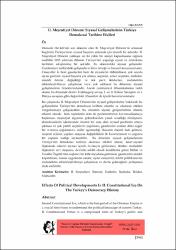| dc.contributor.author | Kaan, Oğuz | |
| dc.date.accessioned | 2021-12-12T16:51:05Z | |
| dc.date.available | 2021-12-12T16:51:05Z | |
| dc.date.issued | 2021 | |
| dc.identifier.issn | 2147-1185 | |
| dc.identifier.issn | 2147-1185 | |
| dc.identifier.uri | https://app.trdizin.gov.tr/makale/TkRNeU1UY3dNQT09 | |
| dc.identifier.uri | https://hdl.handle.net/20.500.11857/2477 | |
| dc.description.abstract | Osmanlı Devleti’nin son dönemi olan II. Meşrutiyet Dönemi’ni anlamakbugünün Türkiye’sinin siyasal hayatını anlamak için önemli bir adımdır. II.Meşrutiyet Dönemi yaklaşık on iki yıllık bir süreyi kapsamasına rağmenözellikle 1923 yılından itibaren Türkiye’nin yaşadığı siyasi ve demokrasitarihinin sıkıştırılmış bir şeklidir. Bu dönemdeki siyasal gelişmelerCumhuriyet tarihindeki gelişmelerin birer örneği ve benzeri konumundadır.Cinayetler ki hem gazeteciler hem de siyasilerin öldürülmesi, çok sayıdasiyasi partinin siyasal hayatta yer alması, seçimler, erken seçimler, darbeler,sürekli iktidar değişikliği ve tek parti iktidarları, muhalefetinetkisizleştirilmeye çalışılması veya yok edilmesi bu dönemin siyasalgelişimlerinin örneklerindendir. Ancak cumhuriyet dönemlerinden farklıolarak bu dönemde devlet Trablusgarp savaşı, I. ve II. Balkan Savaşları ve I.Dünya savaşları gibi olağanüstü dönemleri de içinde barındırmaktadır.Bu çalışmada II. Meşrutiyet Dönemi’nin siyasal gelişmelerine bakılarak bugelişmelerin Türkiye’nin demokrasi tarihine olumlu ve olumsuz etkilerivurgulanmaya çalışılacaktır. Bu dönemin siyasal gelişmelerinin olumluetkileri olarak; hem seçimlerin hem de parlamentonun kurumsallaşmayabaşlaması, meşruiyet algısının gelenekselden yasal- ussallığa dönüşmesi,demokrasilerin işlemesinde önemli bir araç olan siyasal partilerin ortayaçıkması ve çok partili seçimlerin yapılması, gazetelerin kısmen daha özgürbir ortamda çoğalmaları, millet egemenliği ilkesinin önemli hale gelmesi,meşruti rejimin yapılan anayasa değişiklikleri ile kuvetlenmesi ve çoğulcubir yapının varlığı söylenebilir. Bu dönemin siyasal gelişmelerininTürkiye’nin demokrasi tarihine olumsuz etkileri olarak; asker-siyasetilişkisinde askerin siyaset içinde fazlasıyla görünmesi, iktidar- muhalefetilişkisinin sert oluşumu, devletin sahibi olarak kendilerini gören İttihat veTerakki Örgütü’nün seçkinci bir kitle meydana getirmesi, gazetelerin süreklikapatılması, basına uygulanan sansür, siyasi cinayetler, tehdit politikaları ilemuhalefetin etkisizleştirilmeye çalışılması ve darbe geleneğinin yerleşmesiifade edilebilir. | en_US |
| dc.description.abstract | Second Constitutional Era, which is the last period of the Ottoman Empire is a crucial time frame to understand the political landscape of current Turkey. II. Constitutional Period is a compressed form of Turkey's politic and democracy history, especially since 1923, despite the fact that it covers only about 12 years process. The political developments of this term are examples and counterparts of the improvements in the history of the Republic. Political murders, the involvement of many political parties in political life, elections, early elections, coups, continuous power change and single-party governments, trying to neutralize or destroy the opposition are examples of the political developments of this period. However, unlike the republican periods, during this period, the state was involved in the Tripoli war, I. and II. It also includes extraordinary periods such as the Balkan Wars and the First World Wars. In this study, by examining the political events during the II. Constitutional Period the negative and positive effects of these occurrences to Turkey's democracy history will be emphasized. As positive effects of this term, the institutionalization of elections and parliament, the transformation of legitimacy perception from traditional to legal-rationalism, the emergence of political parties and multi-party elections which are essential tools in the functioning of democracies, the proliferation of newspapers in a freer environment and the existence of a pluralistic structure can be said. The negative impacts of this period on Turkey's democracy history can be expressed as the presence of the military in politics, the rigid structure of the power-opposition relationship, the formation of an elitist mass by the Committee of Union and Progress which sees itself as the owner of the state, and the continuous closure of newspapers, that is, the censorship and threat policies applied to the press, and the establishment of the coup tradition. | en_US |
| dc.language.iso | tur | en_US |
| dc.relation.ispartof | İnsan ve Toplum Bilimleri Araştırmaları Dergisi | en_US |
| dc.rights | info:eu-repo/semantics/openAccess | en_US |
| dc.subject | [No Keywords] | en_US |
| dc.title | II. Meşrutiyet Dönemi Siyasal Gelişmelerinin Türkiye Demokrasi Tarihine Etkileri | en_US |
| dc.title.alternative | Effects Of Political Developments In II. Constitutional Era On The Turkey’s Democracy History | en_US |
| dc.type | article | |
| dc.department | Fakülteler, İktisadi ve İdari Bilimler Fakültesi, Siyaset Bilimi ve Kamu Yönetimi Bölümü | |
| dc.identifier.volume | 10 | en_US |
| dc.identifier.startpage | 345 | en_US |
| dc.identifier.issue | 1 | en_US |
| dc.identifier.endpage | 368 | en_US |
| dc.relation.publicationcategory | Makale - Ulusal Hakemli Dergi - Kurum Öğretim Elemanı | en_US |
| dc.institutionauthor | Kaan, Oğuz | |



















